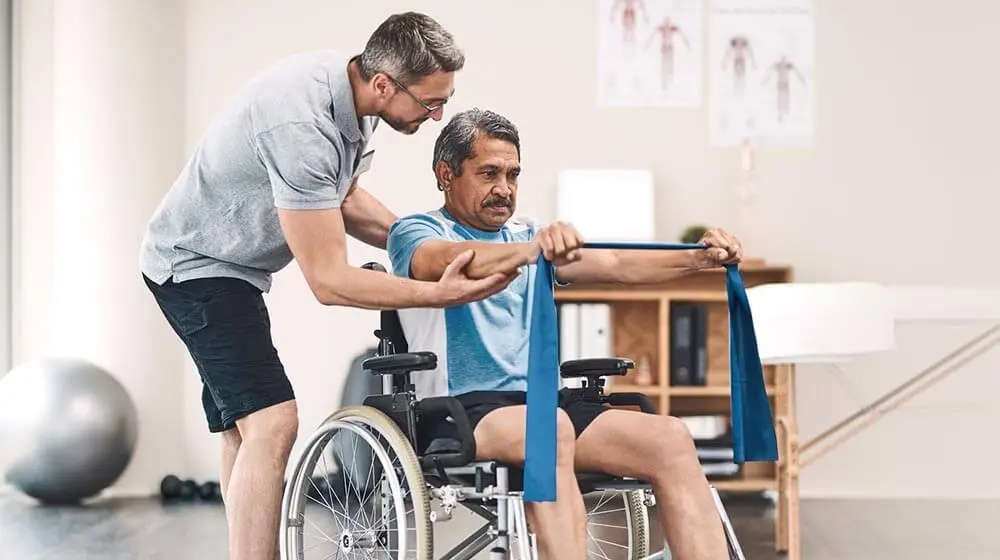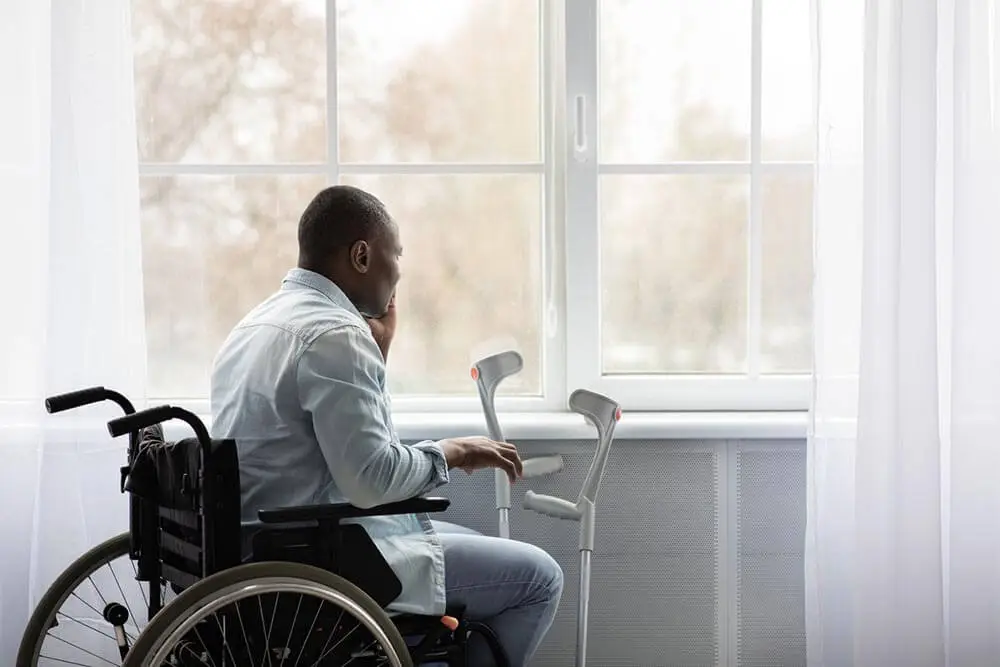What is Spinal Cord Injury?
Spinal cord injury is a life-changing trauma affecting movement, strength and sensation.
The spinal cord (medulla spinalis) is inside the spinal column, surrounded by 33 bones known as vertebrae. The spinal cord extends from the brain to your lower back, and it’s a messenger between the brain and the rest of the body. The spinal cord controls the body’s sensory and motor functions.
In the UK, approximately 50,000 people live with a spinal cord injury, with 2,500 newly injured yearly.
A spinal cord injury involves damage to the nerve roots of the spinal cord that might result in long-term changes in sensation, reflexes and movement. Symptoms and effects of the spinal cord injury depend on the location and intensity of the traumatic spinal cord injury.
Our guideline unravels everything you need to know about SCI and aftercare. People with spinal cord injury can live independent and productive lives with proper access to comprehensive support and humanised care.
Complete and Incomplete Spinal Cord Injury
Your motor and sensory functions after spinal cord injury depend on the severity and location where the injury occurred.
Complete Spinal Cord Injury
A complete injury indicates that the nerves below the affected area cannot communicate with the brain. This may lead to temporary or permanent loss of the physical functions below the injury site.
Incomplete Spinal Cord Injury
An incomplete injury means some motor or sensory functions are below the affected area. The range of motion and sensation depends on the individual and the location where the incomplete injury occurred.
Spinal Cord Injury Symptoms
A spinal cord injury can affect several, many or most of the nerve cells around the injury. A complete recovery is possible only if all or most nerve cells are alive and undamaged.
Typically, spinal cord injury manifests with one or more of the following symptoms:
- Change or loss of sensation in arms and legs
- Numbness and tingling in one or both extremities
- Difficulty or inability to move any part of your body
- Short-term or permanent loss of movement
- Painful and pressure sensations in the head, neck or back
- Paralysis as a result of swelling and bleeding in the spinal cord
- Loss of bladder function
Spinal Cord Injury Paralysis
The effects of spinal cord injury may vary from mild numbness to complete paralysis. Long-term outcomes can also vary from complete recovery to permanent loss of specific body functions. Complete or partial paralysis of the spinal cord is classified as tetraplegia or paraplegia, depending on the organs affected by the spinal cord injury.
Tetraplegia
Tetraplegia, or quadriplegia, often occurs with cervical spinal cord injuries and affects the motor and sensory functions of your neck, arms, trunk, legs and pelvic organs. Tetraplegia is manifested as numbness or paralysis in the cervical region of the spinal cord.
Paraplegia
Paraplegia may affect part or all parts of the lower pelvic area, including the legs, trunk and pelvic organs. The motor and sensory functions of the hands and arms remain intact in the case of paraplegia.

Causes of Spinal Cord Injury
In most cases, traumatic spinal cord injuries are caused by motor trauma. However, certain neurodegenerative disorders can also cause non-traumatic spinal cord injuries.
Spinal cord injuries can be caused by the following:
- Motor vehicle accidents
- Multiple sclerosis
- Falls
- Head injury
- Sudden deprivation of blood supply in the spinal cord
- Spinal injury
- Gunshot wounds
- Infections
- Sports injuries
How is a Spinal Cord Injury Diagnosed?
Acute spinal cord injury is treated as a medical emergency. An immediate medical assessment is necessary for any suspected spinal cord injury. The emergency team will first check your vital signs, like breathing and blood pressure and a complete medical examination.
Spinal cord injury diagnosis includes the following tests:
- X-ray – provides two-dimensional images to show the dislocation and potential fractures of the vertebrae
- Computer tomography scan (CT or CAT) – shows bone fractures or internal bleeding within the spinal cord, including spinal stenosis
- Magnetic resonance imaging (MRI) – provides clear and detailed three-dimensional images to detect traumatic spinal cord injury, disc protrusion and blood vessels deformities
- Necessary blood tests
The medical team will make a health assessment to diagnose the temporary or permanent changes and check for other complications.
Complications of Spinal Cord Injury
Acute spinal cord injury is a sudden and unexpected change in a person’s physical functioning.
Initially, your body might need time to adapt to the new situation. Proper medical care and emotional support are crucial in treating spinal cord injuries.
Our rehabilitation team can design a personalised care plan in stages to foresee and prevent all the potential complications of a spinal cord injury.
People with spinal cord injuries might face some of the following health challenges:
- Urinary tract infections due to loss of bladder control
- Chronic pain in the affected area
- Loss of motor function or muscle movement
- Physical disability
- Increased risk of deep vein thrombosis due to affected mobility
- Pressure ulcers
- Difficulty controlling blood pressure
- Increased risk of lung problems due to inactivity of respiratory muscles and abdominal muscles
- Breathing difficulty
- Sexual difficulties
Our clinicians and support workers will make appropriate living arrangements for you and your family to promote faster adaptation, independence and better quality of life.
Spinal Cord Injury Treatment
Acute spinal cord injury requires long and consistent medical care and support. It starts with an emergency approach to minimise the effects of the trauma, such as neck or head injuries.
Emergency treatment starts with quick spine immobilisation with a rigid neck collar or spinal board to prevent further complications.
Early treatment of spinal cord injury includes:
- Medical care
- Medications and therapy
- Surgical procedure (if necessary)
- Temporary immobilisation (if necessary)
Rehabilitation and long-term care of acute spinal cord injury involve a team of professional healthcare providers to ensure the best recovery possible and your physical and mental well-being.
The ongoing care after spinal cord injury includes:
- Emotional Health support
- Occupational therapy
- Physical therapy
- Personal care
- Recreation therapy
- Nutrition plan
- Medication therapy
Our clinicians and support workers are fellow companions to your recovery journey after a spinal cord injury. We focus on regaining your muscle and fine motor skills and assisting you with daily tasks.
We provide 27/7 personal care that entails emotional and physical support, empowering you to return to your active and fruitful life.

Depression in People with Spinal Cord Injury
Spinal cord injuries cause a significant transformation in people’s lives. A spinal cord injury affects a person’s emotional, mental and physical well-being.
However, most of the challenges with spinal cord injury arise from the lack of integrated care rather than the injury itself. Rehabilitation therapy in SCI primarily focuses on physical care, neglecting the importance of mental health and emotional well-being.
In addition, many people often have to cope with the stigma and barriers imposed by the community and social environment. This often leads to anxiety and depression, making the person feel “not good enough” for society.
Our humanised approach bridges the gap between the needs of people with mental or physical disabilities and social constraints. Our team of highly trained professionals ensures that every individual with spinal cord injury receives the following:
- Acute physical care (PEG feeding, catheter assistance)
- All-encompassing personal assistance
- Compassionate care and support for better adaptation following trauma
- Active support for developing or regaining sustainable employment skills
How Unique Community Services Can Support People with Spinal Cord Injuries
At Unique Community Services, we provide complex care tailored to your individual needs and preferences. We deliver person-centred support at your home, including personal care, assistance with daily activities and medication management.
Our primary goal is to improve the quality of life for the people we serve. We provide unique humanised care that empowers people to maximise their skills and strengths to live a quality and productive life.
We deliver step-by-step support packages that foster independent living tailored to individual needs – from 24/7 care to shorter packages.
You can contact our offices in Bristol and Manchester or contact us directly. We are ready to support you!














